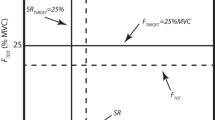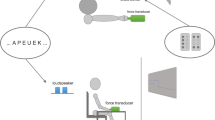Abstract
Successful performance of a memory-guided motor task requires participants to store and then recall an accurate representation of the motor goal. Further, participants must monitor motor output to make adjustments in the absence of visual feedback. The goal of this study was to examine memory-guided grip force in healthy younger and older adults and compare it to performance on behavioral tasks of working memory. Previous work demonstrates that healthy adults decrease force output as a function of time when visual feedback is not available. We hypothesized that older adults would decrease force output at a faster rate than younger adults, due to age-related deficits in working memory. Two groups of participants, younger adults (YA: N = 32, mean age 21.5 years) and older adults (OA: N = 33, mean age 69.3 years), completed four 20-s trials of isometric force with their index finger and thumb, equal to 25% of their maximum voluntary contraction. In the full-vision condition, visual feedback was available for the duration of the trial. In the no vision condition, visual feedback was removed for the last 12 s of each trial. Participants were asked to maintain constant force output in the absence of visual feedback. Participants also completed tasks of word recall and recognition and visuospatial working memory. Counter to our predictions, when visual feedback was removed, younger adults decreased force at a faster rate compared to older adults and the rate of decay was not associated with behavioral performance on tests of working memory.


Similar content being viewed by others
References
Adams JA (1971) Closed-loop theory of motor learning. J Motor Behav 3:111–150
Anderson JR (1982) Acquisition of cognitive skill. Psychol Rev 89:369–406. doi:10.1037//0033-295x.89.4.369
Anguera JA, Reuter-Lorenz PA, Willingham DT, Seidler RD (2010) Contributions of spatial working memory to visuomotor learning. J Cognit Neurosci 22:1917–1930. doi:10.1162/jocn.2009.21351
Baweja HS, Kwon M, Onushko T, Wright DL, Corcos DM, Christou EA (2015) Processing of visual information compromises the ability of older adults to control novel fine motor tasks. Exp Brain Res 233:3475–3488. doi:10.1007/s00221-015-4408-4
Bensmaia SJ, Leung YY, Hsiao SS, Johnson KO (2005) Vibratory adaptation of cutaneous mechanoreceptive afferents. J Neurophysiol 94:3023–3036. doi:10.1152/jn.00002.2005
Bo J, Seidler RD (2009) Visuospatial working memory capacity predicts the organization of acquired explicit motor sequences. J Neurophysiol 101:3116–3125. doi:10.1152/jn.00006.2009
Bo J, Borza V, Seidler RD (2009) Age-related declines in visuospatial working memory correlate with deficits in explicit motor sequence learning. J Neurophysiol 102:2744–2754. doi:10.1152/jn.00393.2009
Bo J, Jennett S, Seidler RD (2011) Working memory capacity correlates with implicit serial reaction time task performance. Exp Brain Res 214:73–81. doi:10.1007/s00221-011-2807-8
Bo J, Jennett S, Seidler RD (2012) Differential working memory correlates for implicit sequence performance in young and older adults. Exp Brain Res 221:467–477. doi:10.1007/s00221-012-3189-2
Buddenberg LA, Davis C (2000) Test–retest reliability of the Purdue Pegboard Test. Am J Occup Ther 54:555–558
Campbell MJ, McComas AJ, Petito F (1973) Physiological changes in ageing muscles. J Neurol Neurosurg Psychiatry 36:174–182
Clark DJ, Fielding RA (2012) Neuromuscular contributions to age-related weakness. J Gerontol A Biol Sci Med Sci 67:41–47. doi:10.1093/gerona/glr041
Clark BC, Manini TM (2010) Functional consequences of sarcopenia and dynapenia in the elderly. Curr Opin Clin Nutr Metab Care 13:271–276. doi:10.1097/MCO.0b013e328337819e
Clark DJ, Patten C, Reid KF, Carabello RJ, Phillips EM, Fielding RA (2011) Muscle performance and physical function are associated with voluntary rate of neuromuscular activation in older adults. J Gerontol A Biol Sci Med Sci 66:115–121. doi:10.1093/gerona/glq153
Craik A (2000) Memory in the aging brain. In: Craik FIM, Tulving E (eds) The Oxford handbook of memory. Oxford University Press, New York, pp 411–425
Decorps J, Saumet JL, Sommer P, Sigaudo-Roussel D, Fromy B (2014) Effect of ageing on tactile transduction processes. Ageing Res Rev 13:90–99. doi:10.1016/j.arr.2013.12.003
Delis DC, Kramer JH, Kaplan E, Ober BA (2000) Manual for the California verbal learning test, (CVLT-II). The Psychological Corporation, San Antonio
Deutsch KM, Newell KM (2001) Age differences in noise and variability of isometric force production. J Exp Child Psychol 80:392–408. doi:10.1006/jecp.2001.2642
Deutsch KM, Newell KM (2003) Deterministic and stochastic processes in children’s isometric force variability. Dev Psychobiol 43:335–345
Eisen A, Entezari-Taher M, Stewart H (1996) Cortical projections to spinal motoneurons: changes with aging and amyotrophic lateral sclerosis. Neurology 46:1396–1404
Enoka RM, Christou EA, Hunter SK, Kornatz KW, Semmler JG, Taylor AM, Tracy BL (2003) Mechanisms that contribute to differences in motor performance between young and old adults. J Electromyogr Kinesiol 13:1–12
Espe-Pfeifer P, Wachsler-Felder J (2000) Neuropsychological interpretation of objective psychological tests. Springer, New York
Folstein MF, Folstein SE, McHugh PR (1975) Mini-mental state. A practical method for grading the cognitive state of patients for the clinician J Psychiatr Res 12:189–198
Grady CL, Craik FI (2000) Changes in memory processing with age. Curr Opin Neurobiol 10:224–231
Incel NA, Sezgin M, As I, Cimen OB, Sahin G (2009) The geriatric hand: correlation of hand-muscle function and activity restriction in elderly. Int J Rehab Res (Internationale Zeitschrift fur Rehabilitationsforschung Revue internationale de recherches de readaptation) 32:213–218. doi:10.1097/MRR.0b013e3283298226
Johansson RS, Cole KJ (1992) Sensory-motor coordination during grasping and manipulative actions. Curr Opin Neurobiol 2:815–823
Johansson RS, Westling G (1984) Roles of glabrous skin receptors and sensorimotor memory in automatic control of precision grip when lifting rougher or more slippery objects. Exp Brain Res 56:550–564
Kalisch T, Ragert P, Schwenkreis P, Dinse HR, Tegenthoff M (2009) Impaired tactile acuity in old age is accompanied by enlarged hand representations in somatosensory cortex. Cereb Cortex 19:1530–1538. doi:10.1093/cercor/bhn190
Kennedy DM, Christou EA (2011) Greater amount of visual information exacerbates force control in older adults during constant isometric contractions. Exp Brain Res 213:351–361. doi:10.1007/s00221-011-2777-x
Lin YH, Hsieh SC, Chao CC, Chang YC, Hsieh ST (2005) Influence of aging on thermal and vibratory thresholds of quantitative sensory testing. J Peripher Nerv Syst 10:269–281. doi:10.1111/j.1085-9489.2005.10305.x
Marsden CD, Obeso JA, Rothwell JC (1983) The function of the antagonist muscle during fast limb movements in man. J Physiol 335:1–13
Mosconi MW, Mohanty S, Greene RK, Cook EH, Vaillancourt DE, Sweeney JA (2015) Feedforward and feedback motor control abnormalities implicate cerebellar dysfunctions in autism spectrum disorder. J Neurosci Off J Soc Neurosci 35:2015–2025. doi:10.1523/JNEUROSCI.2731-14.2015
Neely KA et al (2013) Force control deficits in individuals with Parkinson’s disease, multiple systems atrophy, and progressive supranuclear palsy. PLoS ONE 8:e58403. doi:10.1371/journal.pone.0058403
Neely KA et al (2015) Functional brain activity relates to 0–3 and 3–8 Hz force oscillations in essential tremor. Cereb Cortex 25:4191–4202. doi:10.1093/cercor/bhu142
Neely KA, Chennavasin AP, Yoder A, Williams GK, Loken E, Huang-Pollock CL (2016a) Memory-guided force output is associated with self-reported ADHD symptoms in young adults. Exp Brain Res 234:3203–3212. doi:10.1007/s00221-016-4718-1
Neely KA, Mohanty S, Schmitt LM, Wang Z, Sweeney JA, Mosconi MW (2016b) Motor memory deficits contribute to motor impairments in autism spectrum disorder. J Autism Dev Disord. doi:10.1007/s10803-016-2806-5
Park DC, Lautenschlager G, Hedden T, Davidson NS, Smith AD, Smith PK (2002) Models of visuospatial and verbal memory across the adult life span. Psychol Aging 17:299–320
Poon C, Robichaud JA, Corcos DM, Goldman JG, Vaillancourt DE (2011) Combined measures of movement and force variability distinguish Parkinson’s disease from essential tremor. Clin Neurophysiol 122:2268–2275. doi:10.1016/j.clinph.2011.04.014
Poon C, Chin-Cottongim LG, Coombes SA, Corcos DM, Vaillancourt DE (2012) Spatiotemporal dynamics of brain activity during the transition from visually guided to memory-guided force control. J Neurophysiol 108:1335–1348. doi:10.1152/jn.00972.2011
Reilly JL, Lencer R, Bishop JR, Keedy S, Sweeney JA (2008) Pharmacological treatment effects on eye movement control. Brain Cogn 68:415–435. doi:10.1016/j.bandc.2008.08.026
Salthouse TA (1996) The processing-speed theory of adult age differences in cognition. Psychol Rev 103:403–428
Saults JS, Cowan N (2007) A central capacity limit to the simultaneous storage of visual and auditory arrays in working memory. J Exp Psychol Gen 136(4):663–684
Seidler RD, Bo J, Anguera JA (2012) Neurocognitive contributions to motor skill learning: the role of working memory. J Mot Behav 44:445–453. doi:10.1080/00222895.2012.672348
Tomlinson BE, Irving D (1977) The numbers of limb motor neurons in the human lumbosacral cord throughout life. J Neurol Sci 34:213–219
Tucker AM, Stern Y (2011) Cognitive reserve in aging. Curr Alzheimer Res 8:354–360
Vaillancourt DE, Russell DM (2002) Temporal capacity of short-term visuomotor memory in continuous force production. Exp Brain Research 145:275–285. doi:10.1007/s00221-002-1081-1
Vaillancourt DE, Slifkin AB, Newell KM (2001) Visual control of isometric force in Parkinson’s disease. Neuropsychologia 39:1410–1418
Wang Z, Magnon GC, White SP, Greene RK, Vaillancourt DE, Mosconi MW (2015) Individuals with autism spectrum disorder show abnormalities during initial and subsequent phases of precision gripping. J Neurophysiol 113:1989–2001. doi:10.1152/jn.00661.2014
Wu M, Fannin J, Rice KM, Wang B, Blough ER (2011) Effect of aging on cellular mechanotransduction. Ageing Res Rev 10:1–15. doi:10.1016/j.arr.2009.11.002
Yesavage JA, Brink TL, Rose TL, Lum O, Huang V, Adey M, Leirer VO (1982) Development and validation of a geriatric depression screening scale: a preliminary report. J Psychiatr Res 17:37–49
Zhang Z, Francisco EM, Holden JK, Dennis RG, Tommerdahl M (2011) Somatosensory information processing in the aging population. Front Aging Neurosci 3:18. doi:10.3389/fnagi.2011.00018
Acknowledgements
This publication was supported, in part, by Grants UL1 TR002014 and KL2 TR002015 from the National Center for Advancing Translational Sciences (NCATS) awarded to KAN and a grant provided by the Social Science Research Institute at The Pennsylvania State University awarded to NAD, KAN, and MTD. The content is solely the responsibility of the authors and does not necessarily represent the official views of the NIH.
Author information
Authors and Affiliations
Corresponding author
Ethics declarations
Conflict of interest
The authors declare no competing financial interests.
Rights and permissions
About this article
Cite this article
Neely, K.A., Samimy, S., Blouch, S.L. et al. Memory-guided force control in healthy younger and older adults. Exp Brain Res 235, 2473–2482 (2017). https://doi.org/10.1007/s00221-017-4987-3
Received:
Accepted:
Published:
Issue Date:
DOI: https://doi.org/10.1007/s00221-017-4987-3




